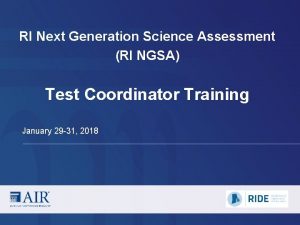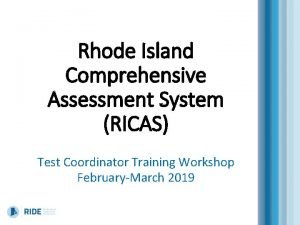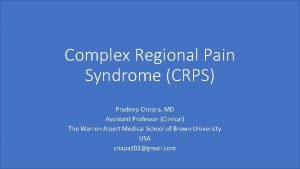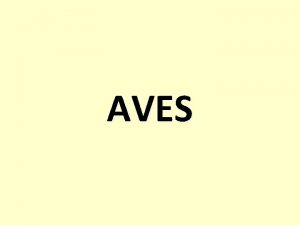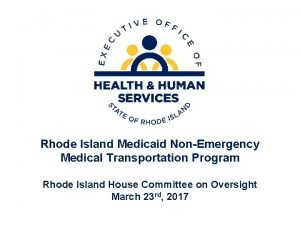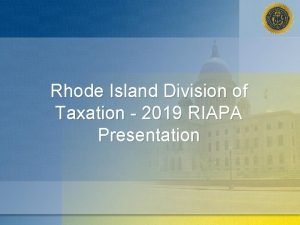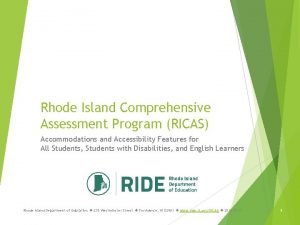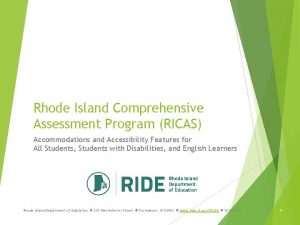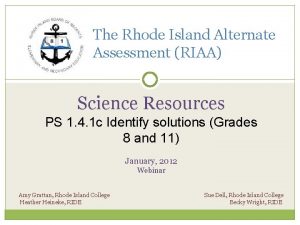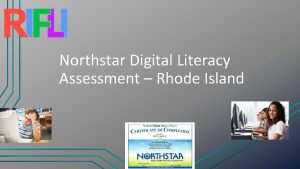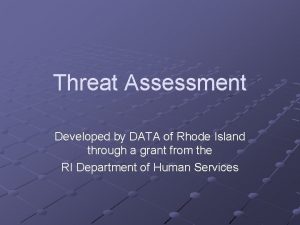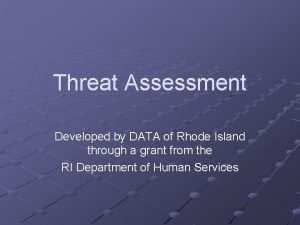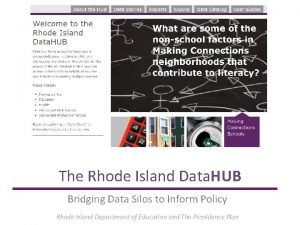Rhode Island Data and Assessment Literacy National Conference













- Slides: 13

Rhode Island Data and Assessment Literacy National Conference on Student Assessment June 20, 2016 Phyllis Lynch, Ph. D Director, Instruction, Assessment and Curriculum Rhode Island Department of Education

RI Strategic Plan: Informed Instructional Decision Making 2

Data and Assessment Literacy Goals • Statewide policies and vision that support the development and use of assessments that improve teaching and learning • High-quality staff development focusing on assessment development and data use • Cadre of highly trained educators in schools to improve assessment practices and assessment literacy statewide • Engagement of educator preparation programs to establish pipeline of highly skilled beginning educators. 3

Rhode Island Policy Framework • Proficiency Based Graduation requirements that focus on establishing competency-based pathways • Educator Evaluation System Standards that incorporate evidence of student learning • Rhode Island Standards for Educator Preparation • Basic Education Program Regulations require Comprehensive Assessment System 4

Proficiency Based Graduation Requirements* Graduation requirements are set at a level to provide students the skills and knowledge to successfully enter and complete a rigorous post-secondary academic or technical program, join the military, and/or obtain a job that leads to a rewarding and viable career. The minimum requirements for earning a RI high school diploma include: o Demonstrated proficiency in 6 core areas (English Language Arts, math, science, social studies, the Arts and technology) o Successful completion of 20 courses (at a minimum) o Completion of 1 performance assessment (exhibitions, portfolios including applied learning) * Currently Under Revision 5

Educator Evaluation Rhode Island is committed to ensuring that all educators receive fair, accurate, and meaningful educator evaluations that provide information that can help all teachers improve and refine their practice. Components of the model include: o Professional Responsibilities o Professional Practice o Student Learning Objectives (SLOs) and/or Student Outcome Objectives (SOOs) 6

Rhode Island Standards for Educator Preparation Set the expectation that programs ensure that completers are ready from day one to be successful educators who positively impact student learning. Candidates must demonstrate o the ability to design, implement, and assess personalized learning experiences that provide all students the opportunity to achieve Rhode Island student standards and o the ability to collect, analyze, and use data from multiple sources- including research, student work and other schoolbased and classroom-based sources to inform instructional and professional practice (Rhode Island Professional Teaching Standard 9) 7

Basic Education Program Regulations Comprehensive Assessment Systems must • include measures of student performance for the purposes of formative, interim, and summative evaluations of all students • Adhere, to the extent possible, to the principles of the National Council on Measurement in Education • Be free from bias and include universal design features that are embedded in the assessments. • Be appropriate for the student population and address the assessment needs of all students, including students with disabilities, culturally and linguistically diverse students, and students in early childhood programs. 8

Vision of Data and Assessment Literacy is the knowledge about the development and use of assessments to improve teaching and learning. As we operationalize what it means to be assessment literate we must include • An understanding of the role of assessment as one of three parts of an educational system which alone cannot improve student learning. Curriculum, instruction, and assessment must be carefully aligned and work together to maximize student learning. • A description of the educator knowledge, skills, and dispositions for assessment literacy defined through Assessment Literacy Indicators • A description of how it supports various purposes in which educators are using assessment data 9

High Education Engagement • Partner with RIDE and PK-12 educators to define Assessment Literacy Indicators • Work with higher education on alignment of course syllabi with Assessment Literacy Indicators • Facilitate partnerships among higher education and LEAs to support educator development of assessment literacy 10

High Quality Professional Learning Experiences • Virtual Professional Development Communities of Practice • In person professional development and coaching for teams of educators o Assessment Literacy Course o Assessment review technical assistance o Calibration Sessions o Secondary Schools Performance Assessment Network • Micro Credentials o Performance Assessment for Learning Micro-Credential Pilot • Higher Education – K/12 Local Education Agency partnerships 11

High Quality Professional Learning Resources • Comprehensive Assessment System Criteria and Guidance o Sections: Background and Rationale; Purposes of Assessment; Types of Assessment; Developing and Selecting Assessments; Interpreting and Communicating Data; Suggested Next Steps o Appendix A: Assessment Matrix/Map Tool o Appendix B: Considerations for Interim & Summative Assessments o Appendix C: Best Practices in Reading and Writing Assessment o Appendix D: Best Practices in Mathematics Assessment o Appendix E: Best Practices in Science Assessment o Appendix F: Best Practices in Social Studies Assessment o Appendix G: Best Practices in Early Childhood Assessment] o Self-Assessment Tool for Awareness, Planning, Support, & Practices • Formative Assessment Online Modules 12

High Quality Professional Learning Resources • Assessment Toolkit Online Module and Guidance Documents o Guidance on Developing & Selecting Quality Assessments o Using Baseline Data: Guidance & Worksheet o Assessment Review Tool & Companion Document o Protocols for Analyzing and Scoring Student Work • Standard Setting for Local Assessments • Deepening Assessment Literacy Online Module 13
 Ngsa practice test
Ngsa practice test Ricas.pearson support.com/student
Ricas.pearson support.com/student Rhode island small business development center
Rhode island small business development center Ri board of governors
Ri board of governors Interesting facts rhode island
Interesting facts rhode island Dr. pradeep chopra
Dr. pradeep chopra Pombo torcaz vias extinção
Pombo torcaz vias extinção Ri eohhs transportation
Ri eohhs transportation Rigl §44-30-12(c)(8)
Rigl §44-30-12(c)(8) Rhode island environmental police
Rhode island environmental police Ricas english language arts
Ricas english language arts Stem cell therapy rhode island
Stem cell therapy rhode island Ricas english language arts
Ricas english language arts Rhode island comprehensive assessments system
Rhode island comprehensive assessments system
